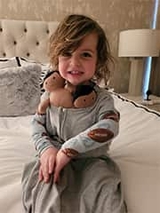Alexander’s Story: Advancing Research and Care for Autosomal Dominant Polycystic Kidney Disease
Alexander’s Story: Advancing Research and Care for Autosomal Dominant Polycystic Kidney Disease
When Carolyn was 28 weeks pregnant with her third child and her doctor in New York discovered that her baby carried the gene for autosomal dominant polycystic kidney disease (ADPKD), she became dedicated to changing the historical lack of pediatric research on the rare disease.

It was spring 2020, at the height of the COVID-19 pandemic. Carolyn was 28 weeks pregnant with her third child, Alexander. Genetic testing and an anatomy scan had both already come back normal, so Carolyn was taken aback when an ultrasound at her next prenatal check-up in New York City showed an abnormality with the fetus’s kidneys.
“It was completely devastating,” says Carolyn. She had already been through a traumatic birth experience with her oldest daughter, who was born premature and spent a month in the neonatal intensive care unit. She didn’t think she could go through anything like that again.
Pinpointing the diagnosis and the plan
Follow-up testing with a maternal-fetal medicine specialist in New York confirmed the diagnosis as autosomal dominant polycystic kidney disease (ADPKD), a condition characterized by the growth of numerous cysts filled with fluid in the kidneys.
“Everyone we knew pointed us to Children’s Hospital of Philadelphia,” says Carolyn. “Everyone told us ‘You’ll never get better care than you will at CHOP.’”
Carolyn and her husband, Will, visited CHOP as soon as they could. They had a thorough evaluation at the Richard D. Wood Jr. Center for Fetal Diagnosis and Treatment and then met with a maternal-fetal medicine specialist. They left that day with a plan: after delivering the baby at the hospital in New York City they would return to CHOP for regular follow-up appointments with the Nephrology team.
Propelling pivotal research

There are two forms of polycystic kidney disease: autosomal dominant polycystic kidney disease (ADPKD) and autosomal recessive polycystic kidney disease (ARPKD). Children with ARPKD usually develop kidney failure earlier, within a few years after birth, while those born with ADPKD usually develop symptoms between age 30 and 40 (though symptoms can begin as early as childhood). The cysts can reduce kidney function, leading to kidney failure that may require lifelong medication, surgery, dialysis and even kidney transplantation.
CHOP’s Nephrology team — led by Erum Hartung, MD, MTR, Co-Director of the Kidney/Liver Program and Director of the Pediatric Nephrology Fellowship Program — first met baby Alexander when he was 3 months old. He continues to have regular follow-up appointments at CHOP to stay ahead of his symptoms.
“He’s so happy to be alive,” says Carolyn of Alexander, a happy, chatty 2-year-old who loves sports, music, singing, reading and people. “He’s so enthusiastic and is a positive light in every room.”
Carolyn and Will know Alexander’s medical care is in the best hands at CHOP, but they saw themselves in a unique position to advance that medical care to new heights. Because ARPKD can be more severe in childhood, funding for pediatric research has focused more on that form of the condition. The condition Alexander has, ADPKD, has been relatively overlooked in pediatric research given its typical onset in adulthood.
“We can’t change the diagnosis, so what can we do,” Carolyn recalls saying to Will. They talked with Dr. Hartung and members of the CHOP Foundation and decided to make a gift to fund a pediatric nephrology fellowship dedicated to researching ADPKD.
“This kind of gift really has an outsized importance for a rare disease,” says Dr. Hartung. “Because this gift supports both the fellowship and a year of research following fellowship training, it really sets someone on a path of pursuing this research for a lifetime.”
The family’s support will pave the way for new research breakthroughs and supports the career growth of the next generation of researchers.
“In some ways, we feel grateful,” says Carolyn. “If this disease was going to happen to anyone, we feel fortunate it was us and that we have the resources to try to improve it, not just for Alexander but for so many other kids who suffer from ADPKD. We feel privileged to be advocates for this disease and to potentially change the trajectory of care.”
“Philanthropy can sometimes be intimidating both because people don’t know where to start and because they feel like their gift will never be ‘enough.’ But I want others to know that you can make a difference, no matter how much you give. Even if you’re not sure where to start,” she adds. “Philanthropy is a chance to dream big — and truly move the needle on solving problems.”